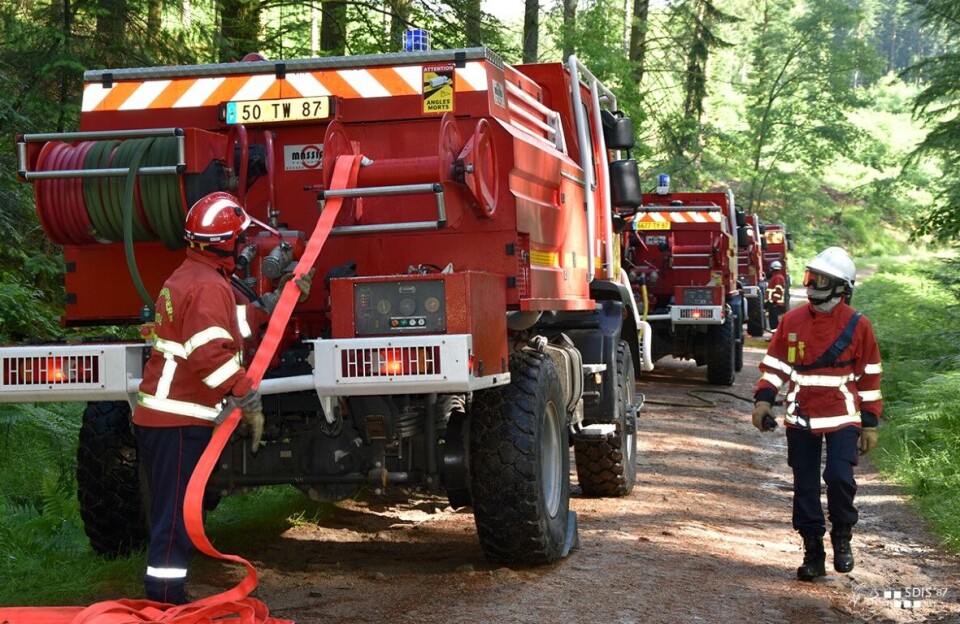-
How to save money on fashion and clothes in France
Growing number of second-hand shops are selling clothes by weight
-
How to deal with asbestos in France
As the material ages, it degrades - becoming more likely to release harmful fibres
-
How can I protect my second home in France from mice while I am away?
Pests can enter homes at any period
How to become a volunteer firefighter in France
Fire stations are always looking for volunteers and the selection criteria is less strict than you might imagine

Lieutenant SPV Antoine Leonet, who manages recruitment of volunteer firefighters in Haute-Vienne, says that fire stations all over France are looking for new volunteers. He says both men and women are welcome, no experience is necessary and you can even serve if you are frightened of fires.
“Becoming a volunteer firefighter is a civic action for your community. Our missions are to prevent and fight fires, provide emergency help, and protect people, belongings and the environment," Lieutenant SPV Antoine Leonet told The Connexion during a 2022 interview.
"Volunteers need to live and/or work within 10 minutes of the fire station,” he added.
He says that out of approximately 250,000 ‘pompiers’ in France, around 200,000 are volunteers. They are not paid unless they are called out, when the hourly rate is around €7.50. It is meant to be a contribution towards expenses rather than a wage.
“[Fire stations are always] looking for new recruits, and I encourage anyone who is even just considering the idea to come along and have a chat.”
You can find your nearest fire-station either by asking at the local mairie or by searching online for sdisxx.fr and replacing xx with the number of your department. (www.sdis30.fr would be for Gard, sdis69.fr for Lyon and so on.)
Read more:I love volunteering in France's sapeurs pompiers
There is no need for 100% physical fitness
“After a period of reflection, if you decide you still want to make the commitment, you take a thorough medical. It doesn’t demand 100% physical fitness, candidates can wear glasses or hearing aids, and can have minor ailments. The medical covers heart and lung function, general fitness, plus eyesight and a blood test.
“Some people are passed as fit with restrictions, fit for emergency service but not for fire-fighting, for example.
“You then join the group, meet everyone and start training. Some people with lots of availability can complete the training in six months, but people have up to three years to complete it. You learn first aid, managing traffic accidents so as to avoid secondary accidents, fire fighting and everything in between.”
Candidates do not need to be hyper-sporty, he says. The main quality is wanting to help other people. People are accepted from 18 to approximately 55 years old and each person makes their own agreement about their availability and what duties they will carry out.
“It depends on each person and what other commitments they have in their life. Agreements are then signed with employers defining when a pompier is on call, and when they can be asked to attend training sessions etc.
“We are very flexible. Employers can refuse to allow their employees to become pompiers, but in practice they seldom do. Employers also usually agree to pay pompiers their normal wages, even during periods spent volunteering. In return, their compensation money goes directly to the employers.”
Some fire stations in cities get multiple calls per day, and others in very quiet rural areas only get 2-3 calls a week. It is vital to be able to speak French. “You don’t need to be perfect, but your French has to be functional and comprehensible.
“We enjoy having English-speaking volunteers, and it can be vital when we’re dealing with people who don’t speak French.”
Side benefits include making new friends, perfecting your French and enjoying the social side of being a volunteer firefighter. “The service relies on relationships and friendships; we’re a real family. I would encourage Connexion readers to come and knock on our doors!”
Related stories:
French firefighter pilots plan strike ahead of ‘worryingly’ dry summer
French firefighters help design own watch to save vital time
























